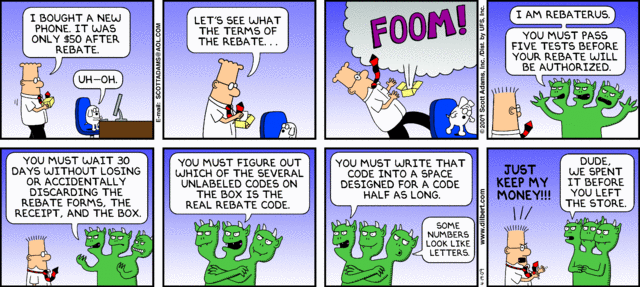A post at Sean’s blog brought back to mind the dangers of doing business with online firms, especially ones with recurring charges. Many people are nervous enough using their credit cards to pay for anything online; where you have to be most careful, however, is when you sign contracts for an ongoing service.
Ten years ago, I signed on to a web host, and like most people, I did not read the long service agreement that they tell you to read. This right here is a pet peeve of mine–that businesses know damned well that people don’t read these, and take advantage of that fact to introduce terms that they know most people would never agree to, or at least would start questioning.
I strongly support the idea of plain-language, bullet-point summaries where standard consumer contracts are concerned. If it’s a business-to-business deal where each side has lawyers to protect the interests of the clients, that’s one thing–but when it’s the average consumer just trying to buy into a simple service, that’s something else. This may not be workable in real life for some reason, but saying that the user “should” read and understand the terms of every single EULA a person agrees to is over-simplistic and ignores basic realities.
Think of all those agreements you skip past and click “I agree”–every update of iTunes, for example, requires this. If you stopped and read through every single such agreement so that you understood it fully, it would make online purchasing a horror. Imagine going to the supermarket and having to read a long, obscure, boring legal document to sign before you paid at the checkout counter. If it’s not reasonable there, why should it be reasonable with documents you sign electronically all the time?
Now, you do have to do this in brick-and-mortar shops, but mostly just with recurring payments (web purchases almost always have lengthy terms, even for one-time purchases), and there is a service person right there to answer whatever questions you have. Online transactions require these long contracts far more often (frequently with one-time purchases equivalent to supermarket visits) and there is no one easily available to help you without a long-distance telephone call where you expect to be put on hold for twenty-five minutes. Not to mention that there is a common perception that clicking “I Agree” is not as weighty as signing your name on the bottom line; to get that effect, you’d have to call it a “digital signature” or something along those lines.
Additionally, the language of these documents is difficult to understand. This may be necessary for legal reasons but there is no reason whatsoever that the same terms cannot be simplified and listed at the top, with the caveat of the fine print being the main determiner of what was agreed to (so long as the bullet points are not misleading or completely different).
The fact that most people don’t read these is clearly evidence enough that the current standard is not something the average person would be inclined to do, thus preventing reasonable expectation of a true meeting-of-minds.
These terms should be boiled down so that the salient points stand out in clear, easy-to-read bullets. True, one could go the full distance and say that such contracts must be written so that the biggest idiot in the world could understand, thus making a mockery of the whole idea. However, the alternative is to leave it as is, where the contract is deliberately dense and long enough to cause most people not to fully read or understand the terms–which is just as much a mockery, just going in the other direction. A reasonable middle can and should be found.
To get on with my original point, I found out about the perils of ignoring such agreements when I signed up for web hosting services with a place called “Aitnet.com”. When you sign up, they have a service agreement which is depressingly boilerplate–you can find dozens of firms, mostly web hosts, with virtually the exact same language.
In this “agreement,” there is a clause, usually down near the bottom after most people who even tried to read the whole thing gave up, which is alarmingly permissive for the business to rip you off. Here is the language–and keep in mind that this is a business which you have given permission to automatically bill you:
12. CHANGES IN TERMS OF AGREEMENT: [company name] reserves the right to make changes to the terms and conditions of this Agreement at any time, and to the on-line application/order form, to include pricing of the Services, advising of the change and the effective date thereof by publishing it to the appropriate [company name] Web site, but with changes in fees being effective only at the end of any period for which Customer has prepaid. Utilization of the Service(s) by Customer following the effective date of such change(s) shall constitute acceptance by Customer of such change(s). Customer is solely responsible for staying informed with respect to changes in this Agreement, to include the application/order form, the AUP, and the BP, all of which are published on-line, as indicated above, and are readily available for public viewing.
Did you get that? Boiled down, it means that the business can, at any time, change the terms of your contract, setting any price they desire, and they do not need to contact you in any way to inform you of this–all they need to do is change a few words in the online agreement. You are responsible for reading and re-reading the agreement every single month and noticing whatever small, unflagged changes may have been made in the contract which consists of many pages of dense legalese.
For example, they could decide to triple your charges and commit you to a year-long contract instead of the month-long contract you agreed to. If you fail to faithfully visit their site and read the agreement in time to catch the change, then you’ll be legally obligated to pay whatever they decided to charge you.
This is along the lines of what happened to a lot of people who signed on to AIT many years ago: AIT suddenly changed their standing contracts from one-month contracts to six-months contracts. Neither I nor anyone else on the service who I spoke to received any email notifying us of this; it may have been buried deeply in some spam-filled monthly ‘newsletter’ that no one reads, but the point is, AIT was not even legally obligated to do that. All you had to do was not carefully check their online agreement for 30 days, and whammo–you’re theirs for another six months and you didn’t even know it.
Now, I can imagine a rational argument for this particular contract clause: a company often needs to make changes in a contract, and though they can make an honest best effort to notify everyone by email, there will inevitably be those who don’t get it. If they promised email notification, that would be kind of messy. So instead, they make it the responsibility of the user to check.
The problem with that, of course, is that it is completely unreasonable to expect regular people to check the long, dense legalese every month for changes of a few words. That is far more unreasonable than expecting the company to dutifully notify everyone by email.
And it’s not as if reasonable solutions could not be found. For example, instead of requiring readers to read the entire contract each month and catch even the smallest of changes, the revisions could also be posted on a central web page dedicated to pointing out such things. It would not be unreasonable to ask customers to check a page like that every month. Alternately, one could have a grace period of one or two months after the new contract is charged to their account where the customer could back out of the agreement when they get their billing for the month and notice the change for the first time. Not that they’d necessarily get a full refund, but they could get back the difference and/or be allowed to terminate the contract with pro-rata refunds.
The way things are now, contracts are slanted heavily in favor of corporations, which can get away with pretty nasty stuff, especially if they are on a decline and expect to be out of business soon–and their executives would like to pick the pockets of their remaining customers for one last, big bonus for themselves before declaring bankruptcy.
Sure, consumers can complain, report them, criticize the publicly, maybe even try to sue them, but corporations know that most people won’t; putting up a small amount of resistance can gain them a lot of money. Just say “no” until a customer really threatens big action, then give in.
These clauses, one would expect, are allowed on the basis of corporations using them in good faith–for example, they have to make some minor, niggling change for circumstances beyond their control. For them to suddenly introduce a major price hike, change the length of contracts significantly, or otherwise do something that any reasonable customer would want to know about beforehand, they should not be able to hide behind the legalese and slip in the change in the fine print, knowing that a vast majority of customers will not notice until too late.
That good faith, in my opinion, was abused by AIT when I dealt with them. Especially coming at a time when many people were getting more and more buggy service, experiencing more and more problems, to suddenly increase the contract length sixfold is not what a reasonable person would expect without a greater effort by the company to inform people. It did not help their image when they maintained the one-month contract period on their main web page, and certainly did not make them look too honest when many customers started reporting over-billing and double-billing upon trying to leave the service.
That’s what happened to me, though the circumstances were kind of bizarre. Actually, AIT’s screw-ups worked to alert me to why I should leave them, and just in time. Despite the fact that I has signed on for automatic payment and my credit card info was in order, and despite the fact that they had already quietly slipped me into their 6-month contract, they suspended my account and shut down my web site for “non-payment” (which they kindly plastered on placeholder on my own domain). When I told them to bring me back up, they billed me for previous “non-payment” which I had actually paid, and then double-billed me for that, all around the time I was making it clear that I wanted out of there. When my complaint became loud enough, they agreed to refund my money–but when I got the “refund,” it was nothing more than store credit, meaningless to someone who is quitting a service.
It was hard for me to get anything done with my site or my account, however, as they had their customer “support” and billing people contradicting each other three times daily in a long-distance telephone hell while consistently shutting down my services in a variety of annoying ways while denying that anything was wrong. This went on for a few weeks, wreaking havoc with my blood pressure.
In the end, I fired off a direct email to their top execs threatening to file a formal complaint to the Better Business Bureau–at which point they promptly closed my account as requested and refunded all overcharges. For a longer version of the whole story, you can see the page I created back at the time.
Just one other pet peeve about online transactions: stopping them. Sure, when you want to sign on to a service, they are very happy to take your money after just a few minutes and some basic info. But when you want to stop paying them, suddenly they don’t trust you anymore, and require a far more difficult set of forms and other hoops to jump through. In the case of AIT, I had to sign a physical piece of paper, fax it back to them, and then wait two days for them to carefully inspect it. As if not taking your money was more of a security risk for you than it was to take it. Clearly they just want to discourage customers from leaving. There should be a consumer law stating that there be no more effort to quitting an agreement than there is to entering into one.
What I guess I am trying to say here is, as always, caveat emptor. That is not a cliché without good reason: it is the nature of businesses to take the upper hand and to wring as much money out of customers as possible (yes, Apple too). That’s simply a given. What makes a good business is when they try their best to deliver a good product or service. But the bad businesses are far too common, and are given far too many tools to rip you off.











